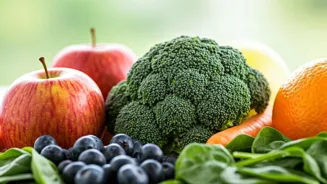Myth 1: Carbs Are Evil
One of the most pervasive myths suggests carbohydrates should be avoided altogether. The reality, however, is that complex carbohydrates provide essential
energy for the body. Experts emphasize that not all carbs are created equal; refined carbohydrates, such as white bread and sugary drinks, should be limited, while whole grains, fruits, and vegetables offer vital nutrients and fiber, supporting overall health. These food choices play an essential role in preventing diseases and help in maintaining a balanced diet.
Myth 2: Detox Diets Work
Many people believe in the power of detox diets to cleanse the body. However, experts generally dismiss these claims. Our bodies naturally detoxify through the liver and kidneys. Excessive use of detox diets often leads to nutrient deficiencies and can be unsustainable. Healthy eating, including a balanced diet with plenty of water and whole foods, is usually sufficient for supporting the body's natural detoxification processes.
Myth 3: All Fats Are Bad
The long-held belief that all fats are detrimental to health is incorrect. Healthy fats are crucial for brain function, hormone production, and nutrient absorption. Unsaturated fats, found in foods like avocados, nuts, and olive oil, are beneficial. Saturated fats should be consumed in moderation. However, trans fats are largely detrimental, which are often found in processed foods and should be avoided to reduce the risk of heart disease.
Myth 4: Eat Late Night Weight Gain
There's an idea that eating late at night leads directly to weight gain. The timing of food consumption is less critical than the overall calorie intake and expenditure throughout the day. Eating a larger number of calories than you burn leads to weight gain, regardless of the time of day. Focus on balanced meals and portion sizes to manage weight effectively, and consider listening to your body's hunger cues.
Myth 5: Gluten is Always Bad
The belief that gluten is harmful to everyone has gained traction. While it is true that people with celiac disease or non-celiac gluten sensitivity should avoid gluten, it's not a problem for most. For individuals without these conditions, gluten consumption is generally safe and does not cause harm. A balanced diet is crucial, and avoiding gluten unnecessarily can restrict essential nutrients found in gluten-containing foods.
Myth 6: Superfoods Solve All
The term 'superfood' is often used to highlight foods like berries, kale, or chia seeds, and while these foods are nutrient-rich, they are not magical solutions for all health problems. No single food alone can guarantee optimal health. A variety of foods in a balanced diet provide a wide range of nutrients that work in synergy. It is always better to focus on overall eating patterns.
Myth 7: Calorie Counting Always Works
Calorie counting is a popular method for weight management, however, it is not always the most effective approach. While it's important to consider calorie intake, the quality of calories matters. Nutrient-dense foods support metabolism and overall health far more effectively than relying solely on calorie counts. Factors like metabolism, genetics, and individual activity levels also play a role in weight management, making a more holistic approach beneficial.
Myth 8: Exercise Alone Is Enough
Many believe exercise alone guarantees weight loss. While physical activity is vital for health and supports weight management, it’s not the only factor. Proper nutrition makes up for a large portion of success in any health-related endeavour. A balance of regular physical activity and a healthy diet is essential for achieving sustainable results. Both elements have to be equally considered to maximize health benefits.
Myth 9: Supplements Replace Food
Supplements are often seen as a way to make up for poor eating habits, but they cannot fully replace the benefits of a varied diet. Whole foods provide a wide array of nutrients, fiber, and other compounds that supplements cannot replicate. While supplements can fill nutritional gaps, they are best used as complements to a healthy diet, not replacements.
Myth 10: Organic Foods Are Best
The belief that organic foods are always superior to conventional foods is common. While organic produce may have advantages, such as reduced pesticide exposure, it doesn't always equate to higher nutritional value. The benefits of organic food depends on the specific food type and farming practices. Both organic and conventional foods can fit into a healthy diet and offer nutritional benefits. The best choice depends on personal preferences and priorities.














